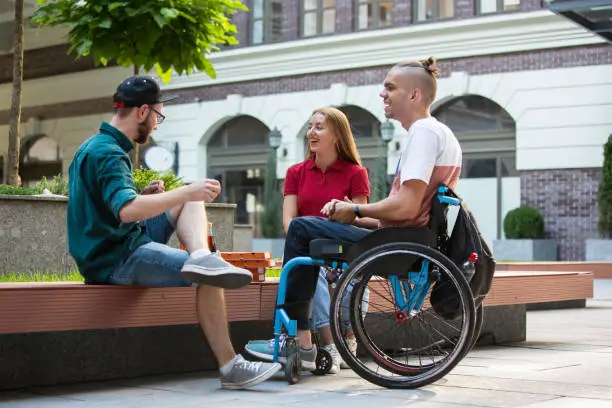Free Government Grants for Disabled Adults refer to financial assistance or funds provided by government agencies or bodies to adults with disabilities.
These grants are typically non-repayable, meaning the recipients are not required to pay back the funds. The primary purpose of these grants is to support and empower individuals with physical, cognitive, sensory, or other forms of disabilities, aiding them in various aspects of their lives.
This could include covering medical expenses, facilitating education and vocational training, ensuring accessible housing, and promoting overall well-being and independence.
Such grants aim to level the playing field, ensuring that disabled adults have equal opportunities and can lead fulfilling lives without the added burden of financial constraints.
Overview of Government Grants for Disabled Adults
Government grants play a pivotal role in offering financial assistance to various sectors of society. Among these, the disabled adult population significantly benefits from such initiatives. These grants are designed to alleviate the financial burdens faced by individuals with disabilities, empowering them to lead fulfilling and independent lives.
In many countries, the welfare of disabled adults is a top priority. Governments recognize that individuals with disabilities often encounter unique challenges in their daily lives. From accessibility issues in public places to employment disparities, these challenges can be vast and multifaceted. Therefore, government grants for disabled adults serve as a testament to a nation’s commitment to creating an inclusive society where every individual, regardless of their physical or cognitive limitations, can thrive.
The essence of these grants is not charity but empowerment. They are a means to level the playing field, ensuring that disabled adults have equal opportunities in various spheres of life. Such financial support can be utilized for a plethora of purposes, including but not limited to:
- Medical Assistance: Many disabilities require ongoing medical attention, treatments, or therapies. Government grants can aid in offsetting these hefty medical bills, ensuring that individuals receive the care they need without being encumbered by financial constraints.
- Educational Opportunities: Higher education can be a gateway to numerous opportunities. For disabled adults aspiring to further their education, these grants can cover tuition fees, accommodation, and other associated costs.
- Employment and Training: Entering the workforce can be daunting for disabled adults. Grants can be used to access vocational training programs, enhancing their skill sets and making them competitive candidates in the job market.
- Home Modifications: To lead an independent life, many disabled individuals require modifications in their homes, making them more accessible. Whether it’s installing ramps, modifying bathrooms, or adapting kitchens, these grants can be a lifeline.
- Transportation: For many, public transportation is not always feasible. Grants can assist in acquiring modified vehicles or supporting other transportation means, ensuring mobility and freedom.
It’s important to note that the scope of these grants is not limited. Governments continuously evaluate the needs of the disabled community, adapting and introducing new grant programs to address emerging challenges. Moreover, several non-governmental organizations (NGOs) and private entities collaborate with governments, magnifying the impact of these initiatives.
However, as with any government program, it’s crucial for applicants to be well-informed. There are often specific criteria that individuals must meet to be eligible. Furthermore, the application processes can be rigorous, necessitating thorough documentation and adherence to deadlines.
List of Grants Offered by Governments and Foundations to Disabled Adults
Across the globe, numerous government bodies and foundations have recognized the need to support disabled adults, ensuring they have equal opportunities and access to resources.
These grants cover a vast spectrum, ranging from medical assistance to educational scholarships. Here’s an in-depth look at some of the most notable grants and the organizations behind them:
- National Disability Assistance Scheme (NDAS): A flagship initiative by many governments, the NDAS provides comprehensive financial aid to disabled adults. This encompasses healthcare, education, employment, and daily living assistance. It’s a testament to the government’s dedication to creating an inclusive society.
- The Able Foundation: This renowned non-profit organization offers grants specifically tailored for disabled adults seeking higher education. Their scholarships aim to bridge the educational gap, ensuring that every individual, regardless of physical or cognitive limitations, has a chance to further their studies.
- Mobility Outreach Program (MOP): Recognizing the transportation challenges faced by many disabled adults, the MOP, funded by several governmental bodies, offers subsidies to modify vehicles, ensuring they are accessible. They also support the acquisition of wheelchairs and other mobility aids.
- Home Adaptation Grants: Many governments have introduced these grants to support disabled adults in modifying their homes. Whether it’s installing ramps, widening doorways, or adapting bathrooms, these grants make homes more accessible, promoting independent living.
- The Independence Trust: A globally recognized foundation, The Independence Trust offers financial support for vocational training and skill development. They believe in equipping disabled adults with the necessary skills to enter the workforce, fostering self-reliance and confidence.
- Healthcare Assistance Fund: Several governments have set up this fund to alleviate the medical expenses of disabled adults. From surgeries to therapies and medications, this grant ensures that individuals receive the care they need without the looming threat of insurmountable bills.
- The Empowerment Initiative: Spearheaded by a coalition of private foundations, this grant focuses on community integration. It funds programs that promote social interaction, community involvement, and overall mental well-being for disabled adults.
- The Global Accessibility Project (GAP): Funded by a mix of government bodies and private entities, GAP emphasizes technological accessibility. They provide grants for acquiring assistive devices like voice-activated systems, screen readers, and specialized software, bridging the digital divide.
- Educational Enhancement Grants: Offered by various education departments worldwide, these grants support disabled adults in acquiring textbooks, specialized equipment, and other educational resources. They believe in fostering an inclusive academic environment.
- The Horizon Trust: This private foundation focuses on research and development. They offer grants to disabled adults pursuing research or innovative projects, believing in their potential to bring groundbreaking solutions to the table.
Eligibility Criteria for Applying
Navigating the world of grants, especially those designed for disabled adults, can be intricate. One of the fundamental aspects applicants must comprehend is the eligibility criteria. This set of requirements ensures that the grants reach those genuinely in need, maximizing their impact. Let’s delve deep into the general eligibility criteria and understand its nuances:
- Proof of Disability: Central to most grants is the requirement for verifiable proof of disability. This often entails medical documentation or certification from a recognized healthcare professional. The documentation should provide explicit details on the nature and severity of the disability, ensuring that the applicant genuinely requires the assistance provided by the grant.
- Income Thresholds: Many grants, especially those offered by government bodies, have income stipulations. These benchmarks ensure that financial assistance reaches those who are economically disadvantaged. Applicants may need to furnish proof of income, which can include pay stubs, tax returns, or official letters from employers.
- Residency Requirements: A predominant criterion for most grants is the residency or citizenship status of the applicant. Typically, to avail of a grant from a specific country or state, the individual must be a legal resident or citizen of that jurisdiction. Proof can range from identification cards, passports, or utility bills indicating the applicant’s address.
- Age Considerations: Some grants target specific age groups within the disabled adult community. Whether it’s for young adults transitioning to higher education or older individuals seeking healthcare assistance, age can be a decisive factor. Birth certificates or government-issued IDs are standard documents to verify age.
- Purpose of the Grant: Each grant has a designated purpose, be it education, healthcare, employment, or home adaptation. Applicants must demonstrate a genuine need aligned with the grant’s objective. For instance, those seeking educational grants might need to provide admission letters or course details.
- Previous Beneficiaries: Some grant programs stipulate that individuals who have previously benefited from the grant cannot reapply or must wait a specific duration before reapplying. This ensures a wider distribution of resources.
- Specialized Training or Skill Development: For grants focusing on employment or vocational training, there might be prerequisites regarding the applicant’s skills or training. This ensures that the funds are used optimally, equipping individuals for specific industries or job roles.
- Endorsements or Recommendations: Certain grants might necessitate endorsements or recommendation letters. These can be from community leaders, educators, or employers, vouching for the applicant’s character and genuine need.
- Commitment to Compliance: Post-approval, grant recipients often have to adhere to specific guidelines on how the funds are utilized. Demonstrating a willingness and capacity to comply with these stipulations can be crucial during the application phase.
- Engagement with the Disabled Community: Some grants prioritize applicants who are actively engaged with the disabled community, be it through volunteer work, advocacy, or community service. This criterion underscores the importance of community involvement and giving back.
In essence, the eligibility criteria for grants are multifaceted, encompassing various aspects of an applicant’s personal, financial, and social standing. It’s paramount for applicants to meticulously understand these requirements, ensuring their applications are robust and stand a higher chance of approval. Equipped with this knowledge, disabled adults can tap into the plethora of grants available, harnessing them to achieve their aspirations and lead empowered lives.
Application Process and Necessary Documentation
Venturing into the domain of grants, especially those tailored for disabled adults, mandates a thorough understanding of the application process and the requisite documentation. A well-prepared application can significantly bolster the chances of approval. Here’s a comprehensive guide to navigating this intricate process:
- Research and Identification: The journey begins with identifying the right grant that aligns with the individual’s needs. Various online databases, government websites, and non-profit organizations offer exhaustive lists of available grants. It’s crucial to select one that perfectly resonates with the applicant’s requirements.
- Initiation of Application: Once the right grant is pinpointed, the next step is accessing the application form. Most organizations have transitioned to digital platforms, making the application process seamless and user-friendly. However, some still operate through traditional paper-based systems.
- Personal Details: The application invariably begins with furnishing personal details. This includes the applicant’s full name, address, contact details, and other essential demographics. Accuracy is paramount to avoid any discrepancies.
- Statement of Purpose: Many grants necessitate a well-articulated statement of purpose. This is the applicant’s opportunity to elucidate their need for the grant, detailing how it will positively impact their life. Crafting a compelling narrative can set an application apart.
- Medical Documentation: For disability grants, medical documentation serves as a cornerstone. This should be a comprehensive report, detailing the nature and extent of the disability. It should be procured from a recognized medical institution or professional.
- Financial Records: As many grants aim to assist the economically disadvantaged, financial records become pivotal. This can encompass bank statements, tax returns, pay stubs, or any official document that provides a clear picture of the applicant’s financial standing.
- Academic or Vocational Details: For grants targeting education or employment, relevant academic or vocational records are imperative. Transcripts, diplomas, certificates, or any proof of vocational training should be collated.
- Recommendations or Endorsements: Some grants might require letters of recommendation. These endorsements can be from educators, community leaders, or previous employers, testifying to the applicant’s character and genuine need for the grant.
- Legal Documentation: Proof of residency or citizenship is often a criterion. Thus, legal documents like passports, identification cards, or any government-issued proof should be kept at hand.
- Submission and Tracking: Once the application is populated with all the necessary details and accompanied by the requisite documentation, it’s time for submission. Digital platforms often provide tracking mechanisms, allowing applicants to monitor the progress of their application in real-time.
- Interviews or Personal Interactions: Some grant bodies prefer a more personalized approach. They might schedule interviews or interactions with the applicants, delving deeper into their needs and aspirations.
- Compliance with Deadlines: Most grant applications come with strict deadlines. Adherence is non-negotiable. It’s advisable to start the application process well in advance, ensuring there’s ample time for any unforeseen contingencies.
- Awaiting Response: Post-submission, there’s a waiting period. Grant bodies meticulously review each application, ensuring the funds reach the most deserving.
Benefits and Utilization of the Grants
Grants, particularly those tailored for disabled adults, are more than just financial aid; they symbolize empowerment, opportunity, and inclusivity. The positive ramifications of these grants are manifold, impacting not just individual recipients but society at large. Here’s a comprehensive exploration of the benefits and effective utilization of these grants:
- Empowerment and Autonomy: At its core, a grant bestows upon its recipients a sense of empowerment. It offers disabled adults the financial autonomy to make choices, be it in education, healthcare, or employment, without being constrained by economic limitations.
- Facilitating Education: One of the most transformative impacts of these grants is in the realm of education. Disabled adults can harness these funds to enroll in courses, purchase necessary materials, or even secure accommodations, paving the way for academic achievements and lifelong learning.
- Bridging Healthcare Gaps: Medical expenses can be daunting, more so for disabled individuals requiring specialized care. Grants alleviate this financial burden, ensuring recipients have access to therapies, medications, and surgeries essential for their well-being.
- Promoting Vocational Skills: Many grants focus on skill development and vocational training. They equip disabled adults with the tools and skills essential to thrive in the workforce, fostering self-reliance and boosting confidence.
- Enhancing Mobility and Independence: Grants can be instrumental in procuring mobility aids, modifying vehicles, or even adapting homes to make them accessible. This not only enhances physical mobility but also promotes a sense of independence and self-sufficiency.
- Community Integration: Several grants target community involvement and social engagement. They fund programs and activities that foster social interactions, ensuring disabled adults are integrally woven into the societal fabric, enhancing their mental and emotional well-being.
- Stimulating Economic Growth: On a macro level, when disabled adults are empowered to study, work, and actively participate in society, it stimulates economic growth. They become contributors to the economy, fostering a cycle of prosperity.
- Innovative Utilization: Some recipients harness grants for innovative endeavors. From starting entrepreneurial ventures to spearheading community projects, the funds serve as a springboard for creativity and innovation.
- Advocacy and Awareness: A segment of grants is dedicated to advocacy and raising awareness about disabilities. Recipients can channel these funds to initiate campaigns, workshops, or seminars, enlightening society and dispelling myths associated with disabilities.
- Research and Development: Some grants emphasize research, be it medical, technological, or social. Recipients can delve into uncharted territories, seeking solutions, innovations, or methodologies that can have wide-reaching impacts.
- Cultural and Recreational Activities: Beyond the tangible, grants also cater to the cultural and recreational aspirations of disabled adults. Whether it’s enrolling in a music class, joining an art workshop, or participating in sports.
Conclusion:
Grants for disabled adults are not merely financial instruments; they are catalysts for change, enablers of dreams, and vehicles of empowerment. They represent society’s commitment to inclusivity, ensuring that every individual, irrespective of physical or cognitive challenges, has the means to lead a fulfilling life.
If this topic resonates with you and you’re keen to delve deeper into the world of grants, consider investing in the “Advanced Grant Writing” book. It offers comprehensive insights, expert tips, and a structured approach to grant writing, ensuring your applications stand out.
Empower yourself with knowledge, and take a proactive step towards unlocking opportunities. Your journey towards mastery in grant writing begins with just one click.
Don’t wait; secure your copy today!
Unlock Your Grant Success!
Join our email list now for exclusive grant-writing tips and unique grant opportunities delivered straight to your inbox. Click here to Subscribe. Don’t miss out!
Elevate Your Grant Writing Game: Dive Deeper with Expert Resources!
If you’ve ever felt the rush of excitement upon spotting a potential grant opportunity, only to be met with the daunting challenge of crafting the perfect proposal, you’re not alone.
Grant writing is both an art and a science, and I’ve distilled years of expertise into a collection of resources tailored to guide you, whether you’re a nonprofit visionary, a rising freelancer, or a small business owner.
Handpicked Titles Just For You:
1. Advanced Grant Writing for Nonprofits: Dive beyond the basics and navigate the intricate nuances to stand out.
2. Becoming the Grant Guru: Embrace your freelance journey with techniques and strategies that ensure success in the grant universe.
3. Mastering Grant Writing: Your nonprofit’s go-to guide for developing compelling proposals that captivate and convince.
4. The Small Business’s Guide to Winning Grants: Tailored insights to ensure your business’s endeavors are backed by the right funding.
Whether you’re taking your first steps in grant writing or seeking to refine your approach, there’s something in this collection for everyone.
Invest in your future now. These titles are available on Amazon, both in Kindle and paperback formats. Arm yourself with the knowledge to not just compete, but to excel.
Dive into a World of Grants Mastery – Grab Your Copies on Amazon
Fuel your passion, secure that funding, and bring your vision to life!
Unlock Your Grant Success!
Join our email list now for exclusive grant-writing tips and unique grant opportunities delivered straight to your inbox. Click here to Subscribe. Don’t miss out!
Work With Me: Elevate Your Nonprofit’s Grant Writing Game!
Hello passionate changemakers,
Does your nonprofit organization resonate with these challenges?
1. Feeling overwhelmed by the intricate maze of grant proposal writing?
2. Struggling to secure vital funding due to lackluster proposals?
3. Battling with limited in-house expertise to identify suitable grant opportunities?
4. Frustrated by not knowing how to articulate your mission effectively to potential funders?
If you nodded in agreement to any of these, you’re not alone. But here’s the good news: Together, we can change this narrative.
Why Partner With Me?
I bring to the table a unique blend of expertise and experience. As a seasoned Grant Writing Consultant, I’ve dedicated my career to mastering the art and science of grant writing. But beyond the knowledge, I carry a heartfelt passion for amplifying the impact of nonprofits like yours.
What I Offer:
1. Grant Writing Training: Let’s empower your team! Through comprehensive workshops, I’ll train your staff to craft compelling proposals that captivate, convince, and convert.
2. Personalized Grant Proposal Writing: Leverage my expertise to develop meticulously tailored proposals that reflect your organization’s vision, mission, and impact stories.
3. Strategic Grant Research: Don’t waste hours on unsuitable opportunities. With my deep industry insights, I’ll help identify grants that align with your objectives and values.
4. Report Development: Secure future funding by showcasing your successes. I’ll help you design robust, engaging reports that keep funders connected to your cause.
Our Journey Together:
Our collaboration begins with understanding – diving deep into your organization’s ethos, the communities you serve, and the impact you wish to create. It’s a partnership where your dreams become mine, and together, we’ll weave narratives that resonate, inspire, and secure the resources you need.
Your work in the nonprofit sector is invaluable. Every program initiated, every life touched, every community transformed – it all starts with a well-written proposal that opens doors to necessary funding. Let me be that catalyst for you.
A Future of Possibilities:
Picture this: A future where your nonprofit isn’t just surviving, but thriving. A world where your initiatives are backed by ample funding, and your stories of impact echo in the hearts of donors and communities alike.
So, if you’re ready to ascend the ladder of grant writing success and fuel your organization’s mission with robust funding, I’m here, eager and ready.
Let’s co-create this success story.
Reach out today, and let’s set the stage for a brighter, impactful tomorrow.
Email Address: queenisrael88@gmail.com
Unlock Your Grant Success!
Join our email list now for exclusive grant-writing tips and unique grant opportunities delivered straight to your inbox. Click here to Subscribe. Don’t miss out!




